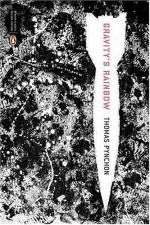|
This section contains 12,451 words (approx. 42 pages at 300 words per page) |

|
SOURCE: McHugh, Patrick. “Cultural Politics, Postmodernism, and White Guys: Affect in Gravity's Rainbow.” College Literature 28, no. 2 (spring 2001): 1-28.
In the following essay, McHugh examines Pynchon's construction of white male identity in Gravity's Rainbow.
You must become your father, but a paler, weaker version of him.
(Barthelme 1975, 179)
Published in 1973 and steeped in the politics of altered states and alternative consciousness, Gravity's Rainbow foregrounds the political question central to debates in the 60s between the counterculture and the New Left: Does alternative cultural practice lead to change in social history? Can culture transform patriarchy? Capitalism? Western civilization? In the years since its publication, Gravity's Rainbow has become canonized in the academy as a classic postmodern novel because its disrupted narrative conventions, its indeterminate epistemology, and its countercultural politics anticipate, indeed, influence later theories of postmodernism. However, Gravity's Rainbow does not live by cultural politics alone. More ambitiously, it focuses on...
|
This section contains 12,451 words (approx. 42 pages at 300 words per page) |

|


